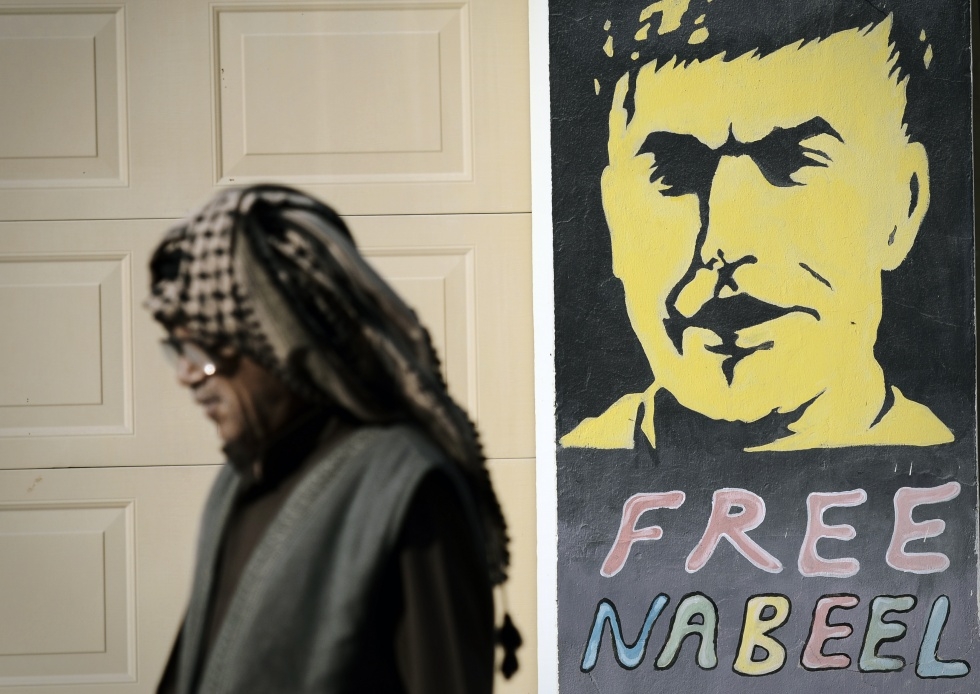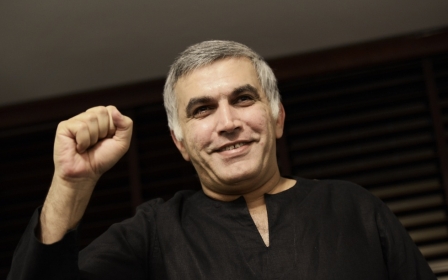United States call on Bahrain to ‘immediately release’ leading rights activist

The United States on Thursday called for authorities in Bahrain to release human rights activist Nabeel Rajab, who was recently arrested for comments on social media about the alleged torture of political prisoners in the Gulf kingdom.
“We certainly are deeply concerned about the arrest on April 2nd of Nabeel Rajab on new charges related to posting information on social media,” State Department spokesperson Jeff Rathke told reporters on Thursday. “And so we’re actively monitoring this case.”
“We urge the Government of Bahrain to drop these charges against Mr Rajab and to release him immediately.”
After his arrest the Ministry of Interior in Bahrain said Rajab was detained for posts to social media that “could incite others and disrupt civil peace”.
The co-founder of the Bahrain Centre for Human Rights had recently tweeted on numerous occasions about allegations that prisoners held at Jaw Prison have been tortured.
In January Rajab was sentenced to serve six months in prison for a tweet deemed insulting to government ministries. However, he was released on bail pending an appeal. The incriminating tweet accused Bahraini security forces of being “the first ideological incubator” for officers who had reportedly joined the Islamic State (IS) group in Iraq and Syria.
On Sunday his appeal against this sentence was postponed until 5 May to allow prosecutors time to investigate new charges against him over the allegations of torture at Jaw, as well as to look into his posts that opposed Bahrain’s participation in the ongoing Saudi-led airstrikes against Houthi rebels in Yemen.
Despite having served several prison sentences and facing a potential 10 years in prison, Rajab has continued to criticise Bahraini authorities, and on Thursday published an article in Foreign Policy accusing the government of ignoring the threat of IS.
“Bahrain’s government has made no move to stem the tide of homegrown terrorism,” he wrote, referring to his tweet on security officers joining IS.
“Not only does the government continue to distribute hateful books, but Islamic State sympathisers are allowed to freely advocate on the terrorist group’s behalf without suffering any government response. If you are a support of the Islamic State [in Bahrain], you can find forums and write your thoughts about the terrorist group’s latest battlefield victories and defeats.”
Bahrain has been in the throes of a popular uprising since February 2011, when pro-democracy protests erupted against the al-Khalifa monarchy. Security forces have cracked down hard on demonstrations against the ruling al-Khalifa royal family, leading to the deaths of scores of activists.
Authorities have accused protesters of being violent – a number of police officers have been killed in sporadic attacks – and say the opposition are backed by Iran, although no specific evidence has been published to back this up.
While the US has spoken out against the arrest of Rajab, the UK – a close ally of the Bahraini monarchy – has been criticised for remaining silent on the matter.
A spokesperson for the Foreign and Commonwealth Office told Middle East Eye on 3 April that they had “no comment” on Rajab’s arrest, which prompted Bahraini activists living in London to call on the UK to consider a change in policy.
“It’s past time that the UK government held up its hands and admitted that Bahrain has broken promises of reform,” said Sayed Ahmed Alwadaei, director of advocacy at the London-based Bahrain Institute for Rights and Democracy, referring to a UK-supported reform programme aimed at addressing rights violations raised by the 2011 uprising.
“The UK’s approach has bought nothing but more time for a government [in Bahrain] that is still using unthinkable methods of repression to crack down on its people.”
At the time of writing British authorities had yet to issue a statement on the arrest of Rajab.
New MEE newsletter: Jerusalem Dispatch
Sign up to get the latest insights and analysis on Israel-Palestine, alongside Turkey Unpacked and other MEE newsletters
Middle East Eye delivers independent and unrivalled coverage and analysis of the Middle East, North Africa and beyond. To learn more about republishing this content and the associated fees, please fill out this form. More about MEE can be found here.




